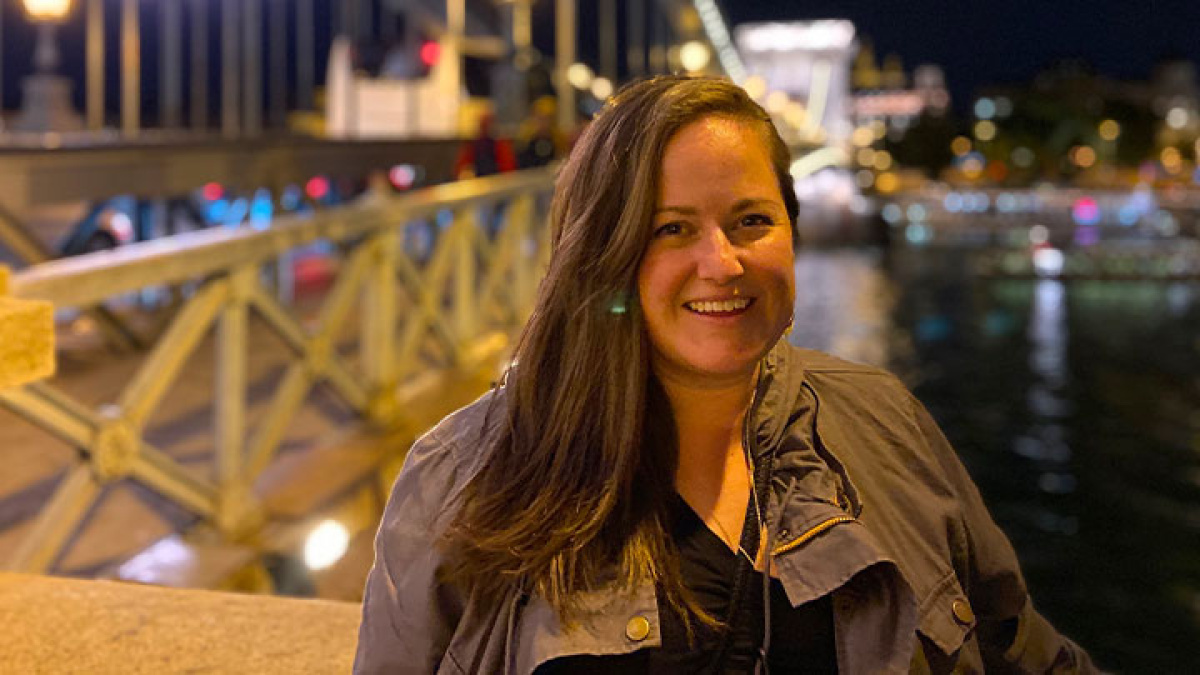
Brittany Betham, MBA '22
At the pandemic’s peak over the summer of 2020, the Metro-Detroit area was a hotspot for COVID-19 cases. Brittany Betham had been working the front lines as an emergency room physician at Henry Ford Hospital and saw first-hand the problems hospitals faced throughout the pandemic. “A lot of what we do on a day-to-day basis now is adjusting patient flow to take good care of patients that have COVID and also prevent cross infections,” she said. “We were a very, very busy emergency department before the pandemic started. So this is just an added layer.” With patient beds filling up faster than usual, hospitals struggled to fend off their breaking point: something Brittany believes had to change in the future.
And on her weekends, she's working toward that change: as a member of the Michigan Ross Weekend MBA cohort Brittany’s learning how to move up the ranks at Henry Ford, so that she can equip hospitals with the tools and funding they need to combat widespread illnesses in the future.
After graduating with an MD from the University of Chicago, Brittany moved on to the University of Cincinnati for her residency. “Once I started working in the emergency department, I started noticing things about patient flow or the care we were providing that I could change.” She realized that to be able to have a seat at the table, she would need to understand where the administration was coming from. It wasn't until she started her career with Henry Ford that the idea of a business degree crossed her mind; Brittany understood that a degree in business was the best way to make her ambitions a reality.
I think it's important for doctors to be in positions of leadership within hospital administration because there's no better way to figure out the needs of your patient population than to be providing clinical care at the bedside.
Finding a weekend MBA program that met her academic needs, while not interfering with her work life, was essential for Brittany. Immediately, the Michigan Ross Weekend MBA program caught her eye: with course sessions two weekends a month and the ability to complete the program in two years, it was the perfect match for Brittany’s criteria. “In my mind, Ross seemed to be the most rigorous of the programs that I looked at. And I wanted a really rigorous education,” she said. With support from her chairman at Henry Ford, Brittany entered the Weekend MBA program at Ross ready to make an impact.
Immediately, Brittany was impressed with her classes. “They’ve been really robust, and I find that the professors are excellent,” she said. “They're thought leaders in their fields, and they come extremely prepared for lectures and the assignments we get are really thoughtful; I feel like I'm learning a lot.” Without a background in business, Brittany was nervous she would struggle to catch up to her peers; her experience has been anything but that. The Michigan Ross REAL learning method helped to bridge the gap between concepts and real-life experiences and has allowed her to think more critically about the decisions hospitals are making.
As she continues with the program, Brittany is excited to gain more beneficial experiences through a Multidisciplinary Action Project (MAP). MAP allows students to find creative solutions for real-world business challenges. The course allows students to pick from projects across an array of fields, to gain experience working for a major corporation. “Even though I was drawn to more medical-related projects, I still think that there's lots of cross-learning that can be done by working on a project outside my field,” she said.
But working full time at a hospital, and taking classes on the weekend, is no easy task. To keep herself grounded, Brittany stays connected with friends, family, and practices DJing. “I think there's an expectation created that, in your mind, 'Oh, I need to be back to my 100% capacity,' but the truth is that we live our lives in a much different way than we used to with a lot more social isolation, and the effect of that, I think, can't be understated.” Maintaining a level of normalcy has helped Brittany stay motivated, moving forward to reach her goals. “I think it's important for people to give themselves permission to not be okay, even for a moment.”
In the future, Brittany hopes to integrate more women into administrative roles at hospitals, so that representation happens at all levels of policy. “In medical school, women make up a pretty sizable proportion. But only about a third of all emergency medicine positions are filled by women, with two-thirds of ER physicians being men.” She and her female colleagues discussed how difficult it was to find female mentors in their field, concluding that they may need to be those women for residents one day. That work had already started to pay off, with female residents reaching out to let her know how inspired they are by her work. “That's been the most gratifying for me. And I think getting a business degree and taking on more roles in leadership can help me to promote women around me, my peers, and women that I'm training to step up into leadership roles as well.”




